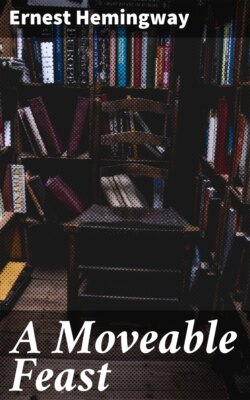Читать книгу A Moveable Feast - Ernest Hemingway - Страница 8
Shakespeare and Company
ОглавлениеIn those days there was no money to buy books. I borrowed books from the rental library of Shakespeare and Company, which was the library and bookstore of Sylvia Beach at 12 rue de l’Odéon. On a cold windswept street, this was a warm, cheerful place with a big stove in winter, tables and shelves of books, new books in the window, and photographs on the wall of famous writers both dead and living. The photographs all looked like snapshots and even the dead writers looked as though they had really been alive. Sylvia had a lively, sharply sculptured face, brown eyes that were as alive as a small animal’s and as gay as a young girl’s, and wavy brown hair that was brushed back from her fine forehead and cut thick below her ears and at the line of the collar of the brown velvet jacket she wore. She had pretty legs and she was kind, cheerful and interested, and loved to make jokes and gossip. No one that I ever knew was nicer to me.
I was very shy when I first went into the bookshop and I did not have enough money on me to join the rental library. She told me I could pay the deposit any time I had the money and made me out a card and said I could take as many books as I wished.
There was no reason for her to trust me. She did not know me and the address I had given her, 74 rue Cardinal Lemoine, could not have been a poorer one. But she was delightful and charming and welcoming and behind her, as high as the wall and stretching out into the back room which gave onto the inner court of the building, were shelves and shelves of the wealth of the library.
I started with Turgenev and took the two volumes of A Sportsman’s Sketches and an early book of D. H. Lawrence, I think it was Sons and Lovers, and Sylvia told me to take more books if I wanted. I chose the Constance Garnett edition of War and Peace, and The Gambler and Other Stories by Dostoyevsky.
“You won’t be back very soon if you read all that,” Sylvia said.
“I’ll be back to pay,” I said. “I have some money in the flat.”
“I didn’t mean that,” she said. “You pay whenever it’s convenient.”
“When does Joyce come in?” I asked.
“If he comes in, it’s usually very late in the afternoon,” she said. “Haven’t you ever seen him?”
“We’ve seen him at Michaud’s eating with his family,” I said. “But it’s not polite to look at people when they are eating, and Michaud’s is expensive.”
“Do you eat at home?”
“Mostly now,” I said. “We have a good cook.”
“There aren’t any restaurants in your immediate quarter, are there?”
“No. How did you know?”
“Larbaud lived there,” she said. “He liked it very much except for that.”
“The nearest good cheap place to eat is over by the Panthéon.”
“I don’t know that quarter. We eat at home. You and your wife must come sometime.”
“Wait until you see if I pay you,” I said. “But thank you very much.”
“Don’t read too fast,” she said.
Home in the rue Cardinal Lemoine was a two-room flat that had no hot water and no inside toilet facilities except an antiseptic container, not uncomfortable to anyone who was used to a Michigan outhouse. With a fine view and a good mattress and springs for a comfortable bed on the floor, and pictures we liked on the walls, it was a cheerful, gay flat. When I got there with the books I told my wife about the wonderful place I had found.
“But Tatie, you must go by this afternoon and pay,” she said.
“Sure I will,” I said. “We’ll both go. And then we’ll walk down by the river and along the quais.”
“Let’s walk down the rue de Seine and look in all the galleries and in the windows of the shops.”
“Sure. We can walk anywhere and we can stop at some new café where we don’t know anyone and nobody knows us and have a drink.”
“We can have two drinks.”
“Then we can eat somewhere.”
“No. Don’t forget we have to pay the library.”
“We’ll come home and eat here and we’ll have a lovely meal and drink Beaune from the co-operative you can see right out of the window there with the price of the Beaune on the window. And afterwards we’ll read and then go to bed and make love.”
“And we’ll never love anyone else but each other.”
“No. Never.”
“What a lovely afternoon and evening. Now we’d better have lunch.”
“I’m very hungry,” I said. “I worked at the café on a café crème.”
“How did it go, Tatie?”
“I think all right. I hope so. What do we have for lunch?”
“Little radishes, and good foie de veau with mashed potatoes and an endive salad. Apple tart.”
“And we’re going to have all the books in the world to read and when we go on trips we can take them.”
“Would that be honest?”
“Sure.”
“Does she have Henry James too?”
“Sure.”
“My,” she said. “We’re lucky that you found the place.”
“We’re always lucky,” I said and like a fool I did not knock on wood. There was wood everywhere in that apartment to knock on too.
